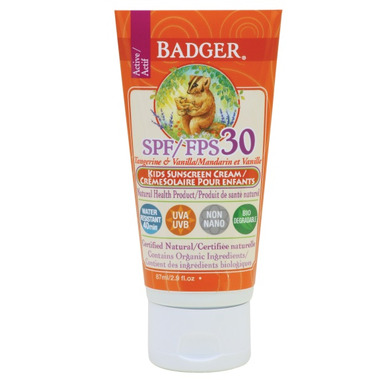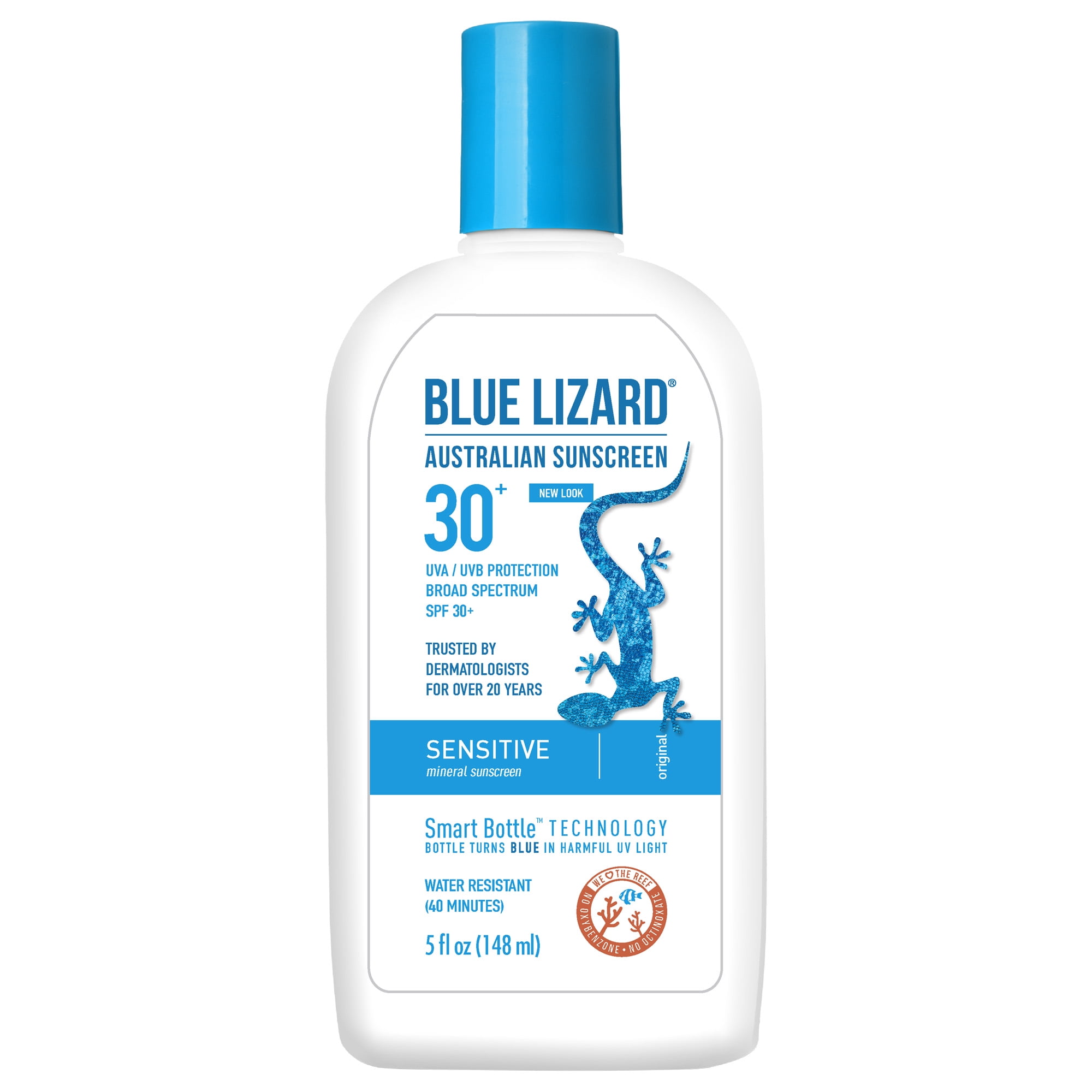Using sunscreen is very important for babies and children because it reduces the risk of too much exposure to the sun. Without sunscreen, your child is at risk of developing skin damage and/or cancer in the future. The younger the child, the more sensitive their skin is to sun exposure and heat, which is why natural, chemical-free sunscreens are considered to be more safe and effective for younger babies and children.
3 Favorite Chemical-Free Sunscreens for babies
ThinkBaby SunScreen
- Pros: This sunscreen has been rated the #1 safe sunscreen since 2010 and is the first sunscreen to pass the Whole Foods Premium Care Requirements. It has the highest level of SPF protection and has water resistance for up to 80 minutes. The sunscreen does not appear greasy when applied.
- Cons: It is not fragrance-free. There are reports of sunburn and skin rashes after using this sunscreen. This may have been because a bad batch (expired) of this sunscreen was sold.
- Costs: Ranges between $10 to $18 depending on the size and the store.
Aveeno Baby Sunscreen
- Pros: This sunscreen has a great mineral formula that is zinc-oxide based which does not cause skin irritation. It is tear-free, which means that it is safe to put onto the face; specifically near the eyes. There is no fragrance with this sunscreen. It is both sweat and water resistant to up to 80 minutes.
- Cons: It has been reported to be a bit greasy and thick, so application may be a bit difficult.
- Costs: Ranges between $8 to $19 depending on the size and the store.
California Baby Sunscreen
- Pros: This sunscreen is used on babies with skin sensitivities and/or fragrance allergies. It is a mineral-based sunscreen with highly micronized titanium dioxide which protects the skin from dangerous UV rays. It also protects the skin from burning, as well as being water resistant for up to 80 minutes.
- Cons: It has a thick consistency which tends to leave a pale (white) layer of sunscreen on the babies skin. It also contains more synthetic ingredients than most sunscreens. Reports of possible irritations to the eyes and possible staining on clothing.
- Costs: Ranges between $10 to $25 depending on the size and the store.
3 Favorite Natural Sunscreen for Kids
Not only do babies have natural, chemical-free sunscreens but so do children. Children, especially the younger ones, should also be using the best natural, chemical-free sunscreens available. Listed are three options that include its pros, cons, and costs.
Badger Kids Sunscreen
- Pros: This sunscreen is USDA Certified Organic (98% organic ingredients) and free of chemicals (100% natural). It protects from all types of UV rays and is water and sweat resistant for up to 40 minutes. It is also biodegradable and coral-reef safe.
- Cons: The resistance is short-lived compared to other sunscreens, and must be reapplied often. There is a strong fragrance (tangerine-and-vanilla scented). Reports of thick and white layered coating when applied.
- Costs: Ranges between $13 to $18 depending on the size and the store.
Babo Botanicals Sunscreen
- Pros: This sunscreen is effective for sensitive skin because it is hypoallergenic. It is mineral-based (zinc-based) and is water resistant for up to 80 minutes. It is also non-greasy, easy to rub in, and reef friendly.
- Cons: There are reports of the sunscreen being sticky when applied.
- Costs: Ranges between $8 to $20 depending on the size and the store.
Blue Lizard Sunscreen
- Pros: This sunscreen is mineral-based (zinc oxide), and dermatologist-recommended. It contains no fragrance and has a pleasant consistency, making it ideal for sensitive skin. It is water and sweat resistant for up to 80 minutes. This sunscreen was also made to protect delicate coral reefs.
- Cons: It is combined with chemical UV protectors.
- Costs: Ranges between $13 to $25 depending on the size and the store.
Some Important Tips:
Some important factors to consider for the best natural, chemical-free sunscreens include broad spectrums that protects against both UVA and UVB rays, water-resistance that lasts from anywhere between 40 to 80 minutes, has a Sun Protection Factor (SPF) of 30+, and an ingredient of titanium oxide, zinc oxide, or avobenzone. Finally, it is important to know how to apply sunscreen onto your child(ren).
- Apply sunscreen to exposed skin at least 30 minutes before going outside (do not forget to also apply to the ears, nose, lips, and top of the feet).
- Reapply sunscreen every 2 hours and after water exposure; such as swimming and/ or sweating.
- Sunscreen should still be applied even during cloudy weather since sun rays can still come through the clouds and affect the skin.
- Remember to check the expiration date of the sunscreen, or for any change in color or consistency. If any of these are present, throw it out and buy new sunscreen.
- Keep in mind that sunscreen is only one way to prevent UV damage, but not the only way. Sunscreen should be combined with other options of protection; such as wearing a hat, wearing sunglasses, being in the shade, etc.
Samanta Nguyen’s bio:
My name is Samantha. I am 25 years old and a full-time graduate student in the field of psychology. I have been a swim instructor for 2½ years; 1 year at Sunsational Swim School. I enjoy teaching babies and young children because of their eagerness to learn and have fun. Although, it is always a fun time in the water when teaching someone to swim. I enjoy the smiles and excitement that are expressed from the parents and children as they see the progression with each swim lesson. My favorite part of the job is being able to be a guide in teaching someone to swim. The job is neither difficult or easy, but instead it is fulfilling and inspirational. When I am not teaching someone to swim, then I enjoy my time with my family and my two dogs.
ABOUT SUNSATIONAL SWIM SCHOOL
Sunsational Swim School is the 🥇 #1 rated provider of private, at-home swimming lessons in America. We have specialized swim instructors for students ages 6 months to adult, beginner to advanced. Featured on ABC, CBS, Impact 100, The List and others, Sunsational instructors have a minimum of 2 years of teaching experience, are CPR certified and insured, and have collectively taught over 302,223 lessons for more than 74,415 students nationwide!








